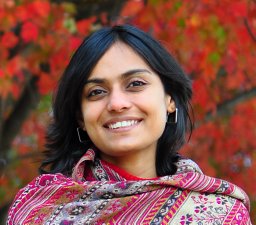Tejaswini Mishra

Dr. Tejaswini Mishra is a postdoctoral research fellow working on personalized medicine in the laboratory of Dr. Michael Snyder at the Genetics department of Stanford University School of Medicine in California. Dr. Mishra obtained her Bachelor’s and Master’s degrees in Biotechnology from the University of Mumbai, India, and her doctoral diploma from The Pennsylvania State University. At Penn State, she used sequencing technology to study regulation of cell fate decisions during blood cell development, ultimately discovering a fate bias in a blood cell progenitor. She also participated in the NHGRI-funded Mouse ENCODE Project, whose goal was to identify functional elements in the mouse genome. In a research career spanning 10 years, she has worked in a wide variety of research areas, including yeast genetics, prostate cancer biology, and blood cell development, and now, personalized medicine. Her current work at Stanford focuses on delineating a personal baseline of health in each individual, using longitudinal multi-omics data collected over time from human subjects. She is currently developing frameworks for integrative analysis of large multi-omics datasets (“big data”) in order to understand human-to-human molecular to variation and predict personal health outcomes and disease trajectories.
N-of-1 Precision Health: An Idea Whose Time Has Come
Advances in high-throughput ‘omics technologies have now made it possible to simultaneously measure billions of biomolecules at a given time, allowing for an unprecedented level of phenotyping of human physiology in health and disease. It has increasingly been becoming clear that precision medicine approaches represent a paradigm shift in clinical care, and are the future of significant strides in healthcare. In his 2015 State of the Union address, US President Barack Obama launched the Precision Medicine Initiative, directing NIH to allocate a $215M budget towards building a precision medicine cohort, as well as towards precision cancer medicine. These approaches have only just begun, since there have been recent advancements in technology and increased digital presence in human life. Greater numbers of people have been taking interest in using digital apps to monitor their health, and are more engaged. We have more accessible tools to collect, manage and understand vast amounts of health data, thus making it the right time to engage in efforts of this kind. The promise of individually tailored medicine, tailored to fit YOU, might finally be coming to fruition.




